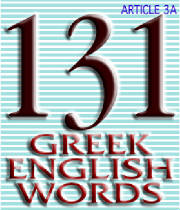List and essay first published in 1985 as: "Latin Lives On-- 333 Common Words That Are Letter-for-Letter Identical In Latin And English,
by Bruce Deitrick Price" ------------------------------------------- EVERY DAY WE USE WORDS
THAT HAVE
REMAINED UNCHANGED
FOR 2000 YEARS
Almost 15 years ago I was riding
the New York subway and chanced to read a sign about “rapid transit.” It struck me that this word transit
must be pure Latin—that is, unchanged in a single letter in 20 centuries. Nero wrote this word, and spoke it!
I was astonished. Were there other such survivors? Yes, and one by one they came to mind: exit, ego, verbatim, stratum,
bonus, alias, minutia, victor. All pure Latin. Or more precisely, pure Latin-English.
But how could all this be
such a shock? I had studied Latin for three years in high school and almost entered a Latin course at Princeton, where I majored
in English literature. I had certainly heard endlessly about origins, etymologies, derivations, and roots. I had heard a hundred
times that English is profoundly “indebted” to Latin.
But here’s
the rub: etymologies and derivations are abstractions, and dry ones. To say that a word derives from Latin or Chinese or Arabic
is interesting but not gripping. To say that you’re speaking a word unchanged in 2,000 years is gripping. I’m
sure this situation is unique in the world’s history. There are, I suspect, few French words identical to Latin ones,
even though the etymological debt may be greater. So it seems that by some marvel of perversity my books and teachers had
harped on origins without ever declaring one of the most arresting facts of our culture—that we daily use words that
Cicero used.
I was, of course, aware of the legal phrases and
the occasional italicized Latin word. (If a word is italicized—or should be—it is ipso facto not English.)
But my emphasis here is on common English words, the profoundly ordinary words that do not announce their heritage. Words
like editor, pelvis, opera, humor, labor . . . .
Reasoning ad hominem, I suspected that a majority of
people have had a similar experience. Informal research confirms this. I have over the years asked dozens of people these
three questions: Did you take Latin? If so, do you know whether there are any words that are the same letter for letter in
both Latin and English? And if you think so, can you give an example?
The answers can be simply summarized. Roughly
half of the people who took Latin state flatly that there are no such identicals. These people, by the way, quickly add that
there are, of course, thousands of cognates and derivatives and linguistic descendants and so on and on. “You know,”
they say, “like manufacture and homicide.” Then they look proud of themselves.
What’s even more intriguing is that the other half—the people who assert confidently that there
surely are such words—can virtually never think of even one!
How can all this
be?
There is Latin on sundials and Latin on coins and Latin on doorways and Latin on college rings, and all of
these occurrences are interesting. But the most interesting Latin of all is most definitely the Latin on our lips.
Would you not think that Latin teachers (and English teachers as well) would be eager to capitalize on these amazing survivors
from a long-ago culture? Yes, if you reflect on it for a minute, you would think that. But they often do not.
Something
there is in the pedagogical mind, it seems to me, that does not like to consort too intimately with the immediate, the known,
the vulgar slant on things. If salt and pepper will illustrate a point in chemistry, you can be reasonably sure that the chemistry
text will speak in dispassionate tones of copper sulfate. And something there is in every textbook that is poisonously concerned
with seeming professorial in the worst sense—versus going for the students’ hearts or, better still, guts.
In short, the epiphany that started out with the word transit has led me to a world of insights into how education
should and should not be conducted. I have been thinking obsessively about my own education, and the thing that strikes me
over and over is how teachers and courses so often conspired to avoid mentioning the breathtakingly fascinating or the unforgettably
immediate. Let me offer as Exhibit A the accompanying list of 333 common words that are letter-for-letter the same in Latin
and English!
I hope that this list of glorious survivors will be used widely (and
xeroxed ad infinitum) to help excite beginning Latin students and to make Latin seem easier to learn and more vital
to all our lives.
It probably goes without saying that the meaning of the words or
the pronunciation or the part of speech (or all three) may have shifted over the centuries. But the changes and differences
are themselves fascinating and instructive. What the Romans meant when they said bonus and alias, and what we mean, can provide
an interesting story and a visceral way to remember a word and its full historic freight.
My list was stopped,
somewhat arbitrarily, at 333, mainly because I liked the symmetry of the number. Naturally, every Latin scholar will think
of words that might have been included. Indeed, the list could be pushed to 350 or even 400 (or, with lots of medical terminology,
to 500 or 600). But you quickly reach more and more obscure words, which defeats my purpose. The power of this list does not
come from its comprehensiveness, but from the ordinariness of the words. The power comes from being able to say to a high
school class: “You already know these words.” Omissions, therefore, are not of moment. What’s important
is that Latin (and English) teachers can use this list to increase the efficiency of their classes. Simply declare, as dramatically
as possible: “Isn’t this amazing?! Here are all these words you already know and—guess what?—Caesar
wrote these same words! Nero spoke at least a few of them while Rome was burning. The early Christians, awaiting the lions,
used these words in their prayers.”
This list, simply by being, tells us all—viscerally and unforgettably—that
Latin lives on. In our minds. In our thoughts. In our sentences. In our lives.
JUST ADDED:
131 GREEK/ENGLISH WORDS...
click the title below.

--
JUST PUBLISHED--Sept., 2014
Seven pages with some pictures. $2.50 to download. Order PDF and give copy to everyone
in the class, etc. (My "store" has several other
booklets, mainly about reading, phonics, etc.) http://www.teacherspayteachers.com/Store/Better-Ideas-Mean-Better-Schools
|
A Letter to the Pope--
"How To Do Latin Right" related
article where I try to enlist the Pope in my crusade to save
American education (more than 80 traditional Catholic sites linked
to this article) |
"Latin
Lives On--333 Common Words That Are Letter-for-Letter Identical
In Latin And English" was first published in Princeton Alumni Weekly, Sept., 1985. It's okay to copy the
list and/or essay but please credit: Bruce D. Price / Improve-Education.org.
|
© Bruce Deitrick Price 1985-2014
 |
 |

abacus
abdomen
aborigines
actor
acumen
addendum
administrator
agenda
aggressor
agitator
album
alias
alibi
altar
alumnus
amen
animal
animus
annotator
ante
antenna
anterior
apex
apostrophe
apparatus
appendix
aquarium
ardor
area
arena
aroma
asparagus
assessor
asylum
audio
auditorium
aura
axis
basis
benefactor
biceps
bonus
cactus
cadaver
calculator
camera
campus
candor
caper
captor
caret
caveat
censor
census
chaos
character
cinnamon
circus
citrus
clamor
climax
coitus
collector
colon
color
colossus
coma
comma
commentator
compendium
competitor
compressor
conductor
confine
consensus
consortium
consul
continuum
contractor
cornucopia
corpus
cranium
crater
creator
creditor
credo
crisis
crux
curator
datum
December
decorum
deficit
delirium
demonstrator
dictator
dictum
dilemma
diploma
discus
distributor
doctor
dogma
drama
duo
duplex
duplicator
echo
editor
educator
ego
elevator
emphasis
emporium
enema
enigma
error
exit
exterior
exterminator
extra
facile
factor
favor
fervor
fetus
fiat
focus
formula
forum
fungus
furor
gemini
genesis
genius
geranium
gladiator
gusto
gymnasium
habitat
helix
hiatus
honor
horizon
horror
humor
hyena
hyphen
icon
idea
ignoramus
illustrator
imitator
impostor
impromptu
incubator
index
indicator
inertia
inferior
inquisitor
insomnia
inspector
instigator
instructor
interest
interim
interior
|
interrogator
investigator
iris
item
janitor
junior
labor
languor
legislator
lens
liberator
liquor
major
mania
martyr
matrix
mausoleum
maximum
mediator
medium
mentor
minimum
minister
minor
minus
miser
moderator
momentum
monitor
moratorium
motor
murmur
museum
narrator
nausea
navigator
nectar
neuter
nucleus
oasis
objector
ode
odor
omen
onus
opera
operator
opus
orator
osmosis
pallor
panacea
par
paralysis
pastor
pathos
patina
pauper
pelvis
peninsula
perpetrator
persecutor
persona
petroleum
phoenix
phosphorus
plasma
platinum
plus
podium
pollen
possessor
posterior
prior
pro
professor
progenitor
propaganda
prosecutor
prospectus
protector
quantum
quota
rabies
radius
rancor
ratio
receptor
recipe
rector
referendum
regalia
regimen
renovator
rhododendron
rigor
rostrum
rumor
saliva
sanatorium
scintilla
sculptor
sector
senator
senior
series
serum
simile
sinister
sinus
siren
solarium
species
specimen
spectator
spectrum
sphinx
splendor
sponsor
squalor
stadium
status
stigma
stimulus
stratum
stupor
successor
sulphur
superior
tandem
tenor
terminus
terror
thesis
thorax
torpor
transgressor
translator
tremor
tribunal
trio
trivia
tuba
tumor
tutor
ulterior
vacuum
valor
vapor
verbatim
vector
vertigo
vesper
veto
vice versa
victor
video
vigil
vigor
villa
vim
virus
visa
viscera
vortex
|
|
|
|
Dear Mr. Price,
I
found your Latin word list, and your “How To Teach Latin” on YouTube this week. I have just today spent about
4 hours making a poster for my Exploratory Latin classes, with a 7th-grade version of that word list (only 267 of the 333),
faces of G.Iu. Caesar and Marcus Antonius at the top–”Look at all the Latin you already know! G.IU.C. and M.A.
spoke these very words and so do you.”
Would love to send
you the Publisher file in thanks for your having done the work of creating the list and the teach Latin video.
I have the great good fortune to be a Latin teacher. My students decline and conjugate
ad infinitum, we sing our grammar (I make grammar raps); year by year, I find they are turning into grammar nerds. They get
excited by new uses of the ablative. It’s heavenly.
And I taught my 3 daughters to read with the very phonetic 19th Century McGuffey readers–I
did not trust that critical learning/teaching endeavor to a public school system intent upon the "Whole Language Method."
Thanks for the work you are doing–even if you are preaching to the choir.
LW
(Southeastern PA)
|
Dear Bruce, Article #3 is superb and I am entranced with Word Information.
What a service the author is providing! I took two and a half years of Latin in high school and my favorite part was the daily
derivation assignments. Over the years I have become a bit of an etymology geek and only find useful a dictionary that gives
a word's etymology. That always helps me more deeply grasp a fuller meaning of a word I "know" and then one day
realize my understanding is a bit vague. I then go and dig for a definition that includes the complete etymology. That helps
me appreciate an author's point and later remember the word meaning more fully. Words are wonderful things. I have grown in
my appreciation for the value those years of Latin study added to my entire life. Thank you for the article, insights and
link. Sincerely, C. M. |
 |